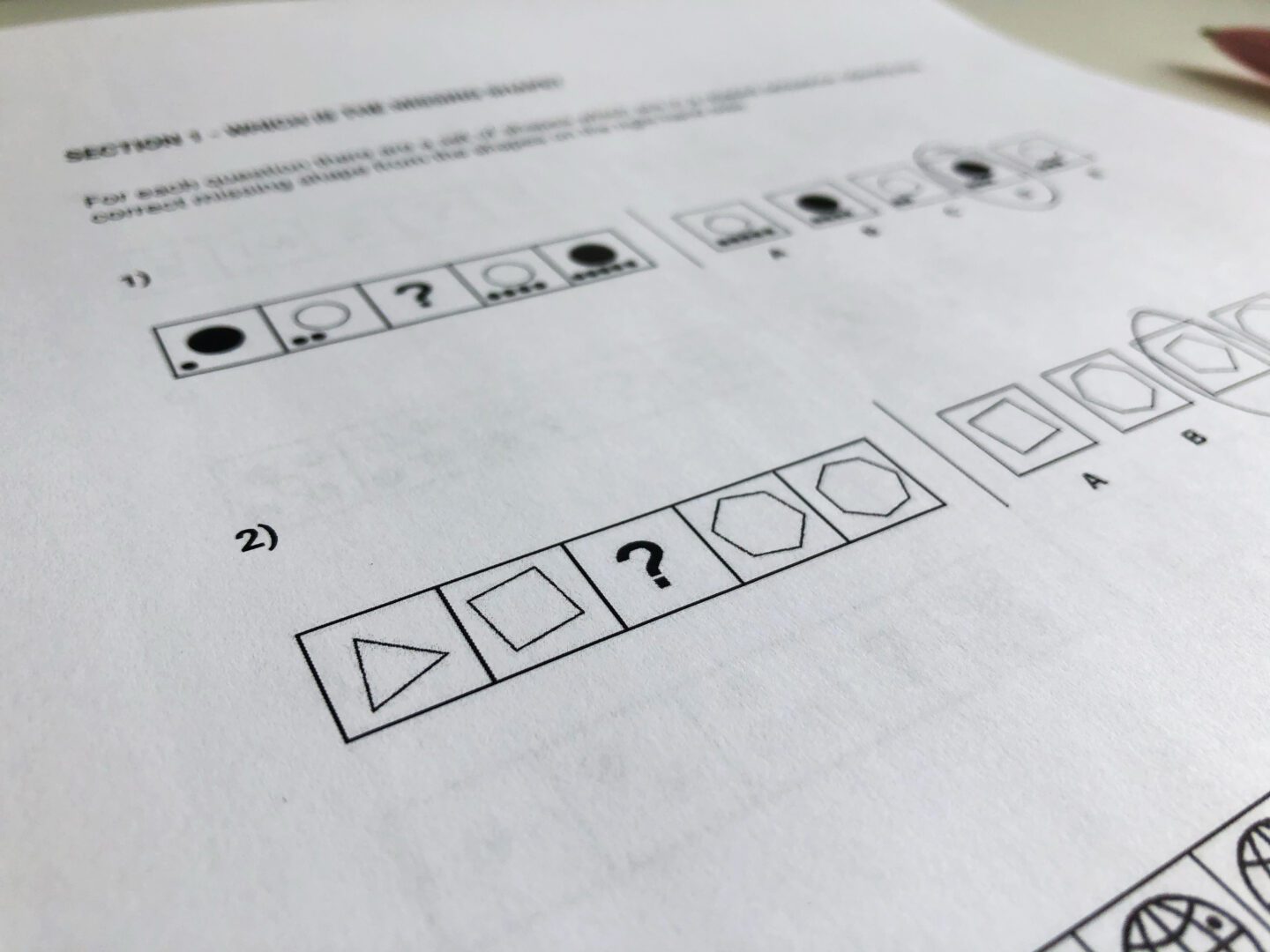
The Exam
With over 40 years of experience, we understand the demands of the exam, and what each school is looking for.
What is on the 11 Plus Non-verbal Reasoning Exam?
What is on the Non-verbal Reasoning syllabus and how can you prepare your child for the exam? Read on for everything you need to know and our top tips.
Non-Verbal Reasoning is one of the most important aspects of the 11 Plus exam. Schools correlate Non-Verbal Reasoning very strongly with natural Mathematical ability and academic potential and are looking for children who can solve non-verbal reasoning puzzles with a high degree of accuracy and speed.
In fact, some schools believe this aspect is so important that they only test Reasoning in their entrance exams, particularly some grammar schools. Other, mainly independent schools set a Pre test that is purely Reasoning based and use this to make a large cut in their applicants, typically losing 50% of candidates at this stage. It is therefore essential that any families on their school entrance journey take Non-Verbal Reasoning seriously and give their child enough time to learn all the question types and practice sufficiently.
What is Non-Verbal Reasoning?
Non-Verbal reasoning is the ability to understand and logically work through concepts and problems expressed pictorially or diagrammatically. Schools want to see how well a pupil can extract meaning, information, and implications from pictures, without the support of their textual or linguistic skills.
Non-Verbal reasoning is, to an extent, a test of skill rather than learned knowledge. It is believed to assess children’s critical thinking skills as well as their ability to solve problems using visual reasoning. Non-Verbal Reasoning is definitely a topic where it is extremely useful to identify whether your child is sitting a CEM or a GL Assessment as the questions are different in style and lend themselves to different resources. We can advise you here.
Can Non-Verbal Reasoning be taught? I’ve heard it is “tutor-proof”.
There is no doubt that schools believe that Non-Verbal Reasoning is a relatively ‘pure’ test of ability and it is true that parents and tutors are less able to influence success, compared to say, helping their child memorise stories for their creative writing tests.
However, some parents have been told that they cannot help their child improve at all and this is absolutely not the case! Although your child will start with a natural affinity for the subject, there are a finite number of types of Non-Verbal Reasoning questions and it is easy to practice and improve on them all, if you start early and work systematically.
We believe that there is an uplift of 10-12% in terms of scoring available from learning how to approach each type of question and practising. A further 10-15% uplift available if your child can develop a speed of collecting up to 1 mark per minute. We cannot stress enough how important a factor speed is in terms of succeeding at Non-Verbal Reasoning exams. A typical Non-Verbal Reasoning test will consist of 60 questions in 1 hour. No matter what proportion of the questions your child solves correctly, they will not pass the test if they only get to question 40.
Types of Non-Verbal Reasoning Questions
Here are some important types of Non-Verbal Reasoning questions, which you should check your child knows how to approach and has practiced. It is by no means an exhaustive list however, and you should always research the type of Reasoning questions that your target schools prefer. There are usually past papers on school websites and many further resources online. We also have our own range of practice papers.

Common types of Non-Verbal Reasoning questions include:
- Working out what a shape would look like when folded or unfolded
- Identifying the mirror image of a shape
- Figuring out the next shape in a sequence
- Figuring out the odd one out in a sequence
- Finding identical shapes in a group of shapes
- Identifying what shapes look like when rotated
Spatial Reasoning
As with all things educational, there are trends, and currently in the world of Reasoning, the trend is for Spatial Reasoning to be included in school assessments. We field many questions from parents about this topic and see many questions by parents on online forums asking what spatial reasoning is and how to help their child improve at it.
Spatial reasoning concerns the ability to picture shapes in 3D and the ability to mentally move them around. Typical questions of this type ask your child to work out how an image has been reflected, rotated or translated as part of a sequence.
Some schools are including these questions in their assessments because they believe they identify children who will excel at Maths and STEM subjects. Parents facing these tests need not panic, as with all aspects of Reasoning, there are only so many potential questions and these can all be thoroughly practised.
There are now specialist resources for Spatial Reasoning, if you would like to focus on this aspect with your child. Here is a good example:
CEM and GL Assessment
CEM and GL Assessment are the two main examining boards for the for both state school 11+ exams and Independent school 11+ Pre-tests. Non-Verbal Reasoning does vary between the two boards and parents must identify which type of test their child will sit and buys the correct practice resources.
CEM is perceived to be the more difficult of the two papers as it is designed to be ‘tutor-proof’ and CEM do not produce or endorse any sample material. The CEM tests change from year to year more than GL tests. In addition, more of the National Curriculum Key Stage 2 English skills are pulled into the CEM Reasoning syllabus.
Both CEM and GL Verbal Reasoning tests are very time pressured.
How can I help my child develop their Non-Verbal Reasoning skills?
- Firstly, aim to familiarise your child with each type of Non-Verbal reasoning question that they will come across. Teach them how to approach each type of question and how best to solve them. We have specialist tutors who can help you to do this if you don’t have the knowledge or time.
- Once children are familiar, aim for accuracy. Encourage them to take their Non-Verbal Reasoning practise slowly at first when they are learning how to approach the questions and concentrate on speed only when their knowledge is secure. It is very important that children read the question carefully.
- From the Summer holidays of Year 5 practice Verbal and Non-Verbal reasoning every day. Bond 10-minute test books are perfect for this. A little bit and often works best.
- From September of Year 6, you must encourage your child to work through their Non-Verbal Reasoning practice at speed. They will need to pick up 1 mark per minute, whilst maintaining their accuracy. This is an essential element of their preparation as Reasoning tests are notoriously time pressured. There is no point in your child answering accurately but only getting halfway through the paper in the allotted time. This is a hurdle we feel many parents never get through and is a common reason why children do not perform to their potential in entrance exams.
- Learn Reasoning specific exam technique – this will depend on the individual exams your child will sit. For example, some digital tests do not allow children to go back at the end to check their work or answer difficult questions, whereas this would absolutely be the correct technique in some written papers. Our tutors can advise on specific school tests.
How can we help?
Here at Mentor Education, we specialise in school admissions. Our results speak for themselves, with 90% of our 2020-21 cohort achieving their first-choice school in 2021 and 100% receiving an offer from their first or second choice school.
The key to this success is our annual school entrance programme that builds each year, from January of Year 5 to the January of Year 6, encompassing the whole syllabus, across all disciplines tested in the exams themselves, exam technique and question practice. This allows young children to develop at an appropriate pace, with no element of cramming. We see your journey in three distinct phases and have organised our work to support you at each of these.
Our School Entrance Co-ordinator
One of the main advantages of working with Mentor Education is that we can coordinate your whole school entrance journey. Our dedicated Co-ordinator works full time to get to know you, your child and your aspirations and can flex our services to reflect what you need at any point in your journey.
For example, if you don’t know where to start or don’t know if your child is a good candidate for the exams, our Co-ordinator can arrange an academic assessment brimming with data points to help you make decisions, target schools and focus tuition only on where your child needs it.
If your child’s needs change throughout the year, our Coordinator can swap out a general tutor, bringing in Reasoning experts or Scholarship experts as needed.
Essentially, our School Entrance Co-ordinator’s job is to stay close to your journey and assist every step of the way.
Specialist Reasoning Tuition

We have specialist school entrance tutors, who understand in great detail the Reasoning tests set by each of the schools they prepare pupils for. These can change year by year and our exam tutors are always up to date with the latest knowledge. For example, many schools are increasing their proportion of Spatial Reasoning questions and this is a trend we see across the London Independent Sector. Our tutors are very experienced and can help.
Get in Touch
We have plenty of information and top tips on the exam. Contact a member of the team today to find out how we can help your child, whatever stage they’re at in their school entrance journey.
London’s No.1 tuition agency
“For more than 35 years they have been helping students achieve places at the top London day and boarding schools.”